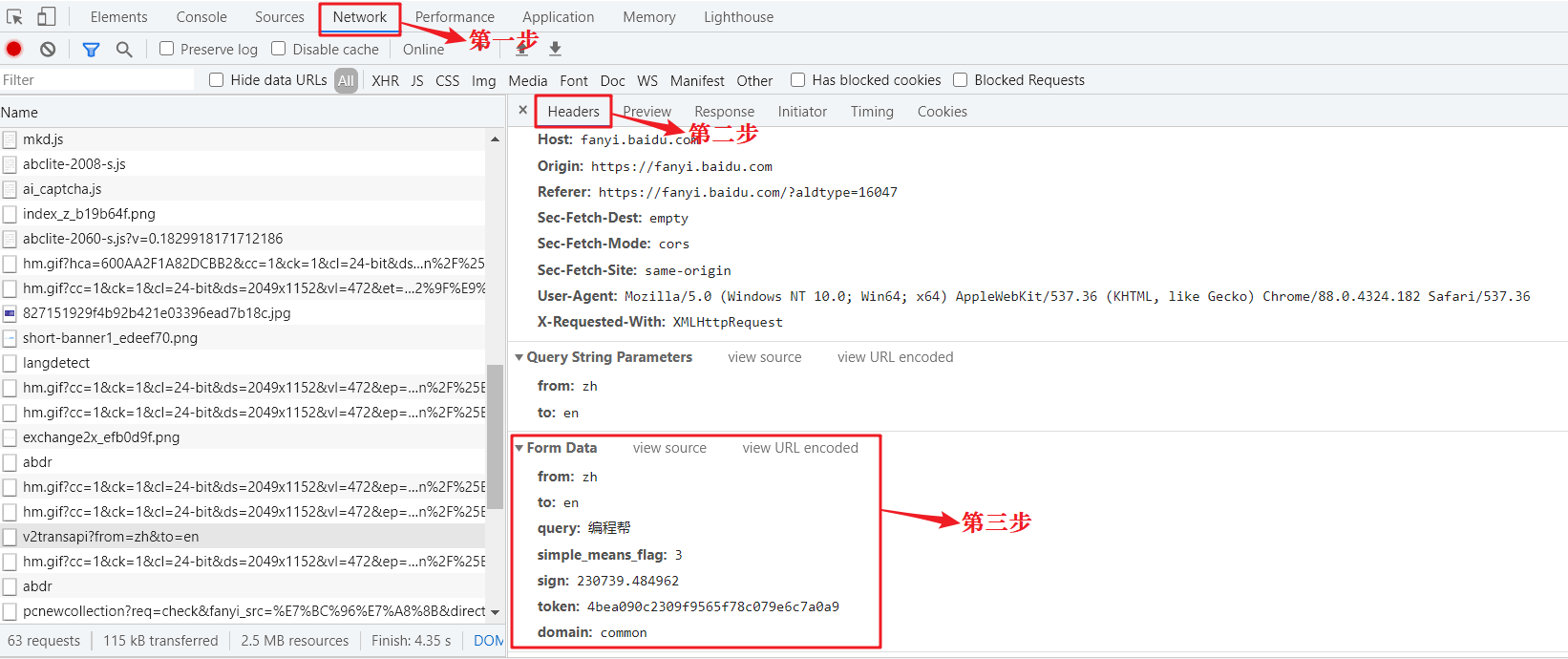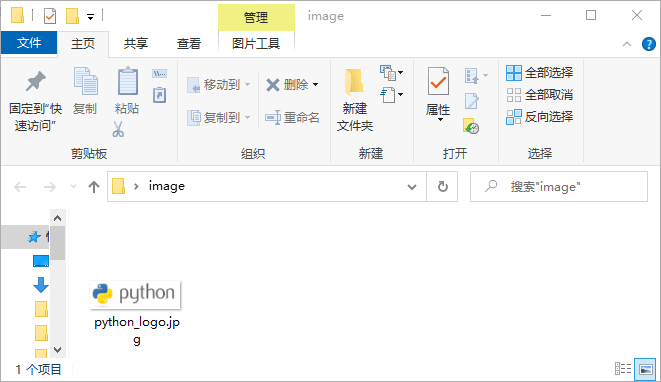Python Requests库
精华
小牛编辑
146浏览
2023-03-14
Python 提供了多个用来编写爬虫程序的库,除了前面已经介绍的 urllib 库之外,还有一个很重的 Requests 库,这个库的宗旨是“让 HTTP 服务于人类”。

Requests 是 Python 的第三方库,它的安装非常简便,如下所示:
具体使用示例如下:

使用示例如下所示:
首先打开百度图片( https://image.baidu.com/),并在输入框搜索 “python logo”,然后使用 Chrome 开发者工具查看第一张图片的源地址,即 data-imgurl 所对应的 url 地址,如下所示:

图2:Requests库简单应用

python -m pip install requestsRequests 库是在 urllib 的基础上开发而来,它使用 Python 语言编写,并且采用了 Apache2 Licensed(一种开源协议)的 HTTP 库。与 urllib 相比,Requests 更加方便、快捷,因此在编写爬虫程序时 Requests 库使用较多。
常用请求方法
1) requests.get()
该方法用于 GET 请求,表示向网站发起请求,获取页面响应对象。语法如下:res = requests.get(url,headers=headers,params,timeout)参数说明如下:
- url:要抓取的 url 地址。
- headers:用于包装请求头信息。
- params:请求时携带的查询字符串参数。
- timeout:超时时间,超过时间会抛出异常。
具体使用示例如下:
import requests url = 'http://baidu.com' response = requests.get(url) print(response)输出结果:
<Response [200]>获取带查询字符串参数的响应对象,如下所示:
import requests
data = {
'name': '编程帮',
'url': "www.xnip.cn"
}
response = requests.get('http://httpbin.org/get', params=data)
#直接拼接参数也可以
#response = requests.get(http://httpbin.org/get?name=gemey&age=22)
#调用响应对象text属性,获取文本信息
print(response.text) 输出结果:
{
"args": {
"name": "\u7f16\u7a0b\u5e2e",
"url": "www.xnip.cn"
},
"headers": {
"Accept": "*/*",
"Accept-Encoding": "gzip, deflate",
"Host": "httpbin.org",
"User-Agent": "python-requests/2.23.0",
"X-Amzn-Trace-Id": "Root=1-60420026-236f9205646b68706d0fafa7"
},
"origin": "121.17.25.194",
"url": "http://httpbin.org/get?name=\u7f16\u7a0b\u5e2e&url=www.xnip.cn"
}
2) requests.post()
该方法用于 POST 请求,先由用户向目标 url 提交数据,然后服务器返回一个 HttpResponse 响应对象,语法如下:
response=requests.post(url,data={请求体的字典}) 示例如下所示:
import requests
#百度翻译
url = 'https://fanyi.baidu.com'
#post请求体携带的参数,可通过开发者调试工具查看
#查看步骤:NetWork选项->Headers选项->Form Data
data = {'from': 'zh',
'to': 'en',
'query': '编程帮www.xnip.cn你好'
}
response = requests.post(url, data=data)
print(response) 输出结果:
<Response [200]>查看 Form Data 的步骤,如下图所示:

图1:Chrome开发者调试工具(
点击看高清图)
对象属性
当我们使用 Requests 模块向一个 URL 发起请求后会返回一个 HttpResponse 响应对象,该对象具有以下常用属性:| 常用属性 | 说明 |
|---|---|
| encoding | 查看或者指定响应字符编码 |
| status_code | 返回HTTP响应码 |
| url | 查看请求的 url 地址 |
| headers | 查看请求头信息 |
| cookies | 查看cookies 信息 |
| text | 以字符串形式输出 |
| content | 以字节流形式输出,若要保存下载图片需使用该属性。 |
使用示例如下所示:
import requests
response = requests.get('http://www.baidu.com')
print(response.encoding)
response.encoding="utf-8" #更改为utf-8编码
print(response.status_code) # 打印状态码
print(response.url) # 打印请求url
print(response.headers) # 打印头信息
print(response.cookies) # 打印cookie信息
print(response.text) #以字符串形式打印网页源码
print(response.content) #以字节流形式打印 输出结果:
#编码格式
ISO-8859-1
#响应码
200
#url地址
http://www.baidu.com/
#请求头信息
{'Cache-Control': 'private, no-cache, no-store, proxy-revalidate, no-transform', 'Connection': 'keep-alive', 'Content-Encoding': 'gzip', 'Content-Type': 'text/html', 'Date': 'Mon, 08 Mar 2021 05:19:33 GMT', 'Last-Modified': 'Mon, 23 Jan 2017 13:27:29 GMT', 'Pragma': 'no-cache', 'Server': 'bfe/1.0.8.18', 'Set-Cookie': 'BDORZ=27315; max-age=86400; domain=.baidu.com; path=/', 'Transfer-Encoding': 'chunked'}
#查看cookies信息
<RequestsCookieJar[<Cookie BDORZ=27315 for .baidu.com/>]>
...内容过长,此处省略后两项输出
Requests库应用
示例应用:使用 Requsets 库下载百度图片。首先打开百度图片( https://image.baidu.com/),并在输入框搜索 “python logo”,然后使用 Chrome 开发者工具查看第一张图片的源地址,即 data-imgurl 所对应的 url 地址,如下所示:
data-imgurl="https://ss2.bdstatic.com/70cFvnSh_Q1YnxGkpoWK1HF6hhy/it/u=38785274,1357847304&fm=26&gp=0.jpg"可以将上述 url 粘贴至浏览器地址栏进行验证。当我们确定图片地址后,就可以使用 requests 库进行编码了:
import requests
url = 'https://ss2.bdstatic.com/70cFvnSh_Q1YnxGkpoWK1HF6hhy/it/u=38785274,1357847304&fm=26&gp=0.jpg'
#简单定义浏览器ua信息
headers = {'User-Agent':'Mozilla/4.0'}
#读取图片需要使用content属性
html = requests.get(url=url,headers=headers).content
#以二进制的方式下载图片
with open('C:/Users/Administrator/Desktop/image/python_logo.jpg','wb') as f:
f.write(html) 最后,您会在桌面文件夹中找到已经下载好的图片,如下所示:

图2:Requests库简单应用
